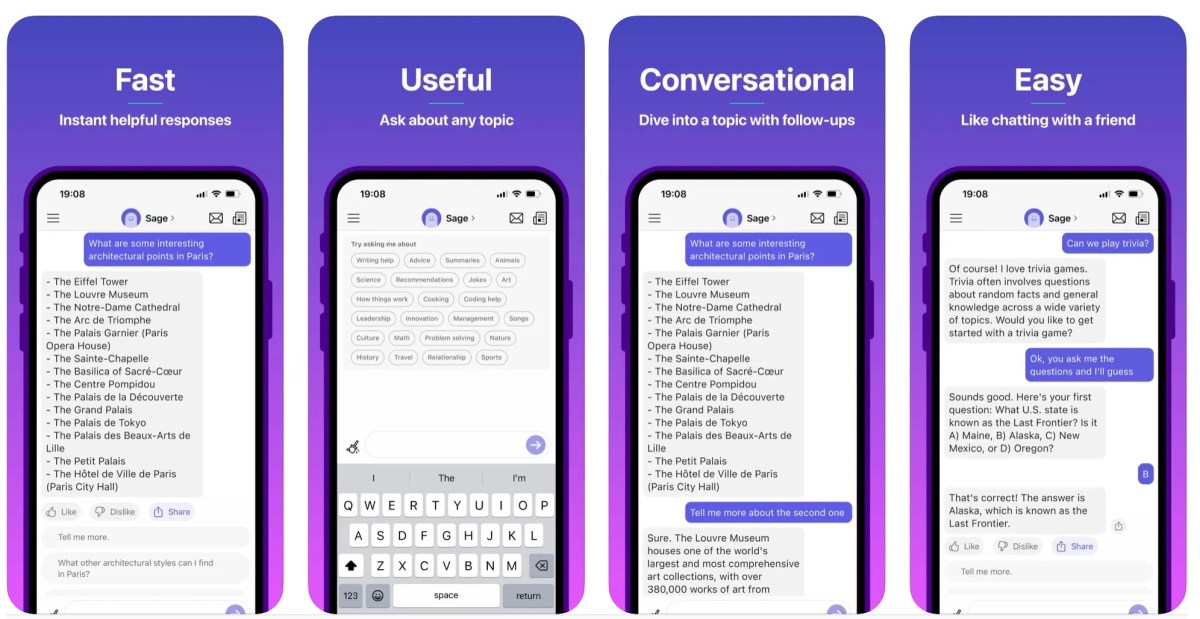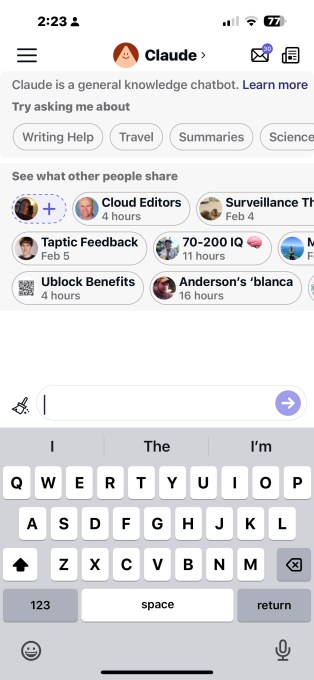Quora opens its new AI chatbot app Poe to the general public
Q&A platform Quora has opened up public access to its new AI chatbot app, Poe, which lets users ask questions and get answers from a range of AI chatbots, including those from ChatGPT maker, OpenAI, and other companies like Anthropic. Beyond allowing users to experiment with new AI technologies, Poe’s content will ultimately help to […] Quora opens its new AI chatbot app Poe to the general public by Sarah Perez originally published on TechCrunch

Q&A platform Quora has opened up public access to its new AI chatbot app, Poe, which lets users ask questions and get answers from a range of AI chatbots, including those from ChatGPT maker, OpenAI, and other companies like Anthropic. Beyond allowing users to experiment with new AI technologies, Poe’s content will ultimately help to evolve Quora itself, the company says.
Quora had first announced Poe’s mobile app in December, but at the time, it required an invite to try it out. With the public launch on Friday, anyone can now use Poe’s app. For now, it’s available only to iOS users, but Quora says the service will arrive on other platforms in a few months.
In an announcement, the company explained it decided to launch Poe as a standalone product that’s independent of Quora itself because of how quickly AI developments and changes are now taking place. However, there will be some connections between the Q&A site and Poe. If and when Poe’s content meets a high enough quality standard, it will be distributed on Quora’s site itself, where it has the ability to reach Quora’s 400 million monthly visitors, the company noted.
To use Poe — which stands for “Platform for Open Exploration” — iOS users will have to create an account that’s verified with both a phone number and email address. They can then switch between three different AI chatbots available at launch.
These include the general knowledge chatbots Sage, Claude and Dragonfly. Both Sage and Dragonfly are powered by OpenAI while Claude is powered by Anthropic technology. All have their own limitations at present. For instance, Sage and Claude don’t have knowledge of events after 2021, and Dragonfly may refuse to answer some questions. All three have been known to make incorrect statements — which is another reason why Quora itself isn’t immediately integrating Poe into its service.

Image Credits: Poe screenshot
The factual inaccuracies offered by AIs like ChatGPT have raised concerns about whether these technologies are ready for primetime. The Wall Street Journal, for example, recently reported how ChatGPT has been shown to be fairly bad at math problems written in natural language, often returning entertaining, but entirely wrong answers with confidence. Another Q&A site, Stack Overflow, also banned users from posting answers created by ChatGPT because of inaccuracies.
Quora, however, sees Poe’s potential in helping AI developers with making their models more useful for the public, by offering an easy-to-use chat interface — something that’s not always the focus for companies building the AI models themselves.
” … most people and even most companies who are capable of training or fine-tuning these models are not well suited to create these interfaces,” explained the Quora blog post, penned by Quora CEO Adam D’Angelo. “This is particularly true in the back-and-forth dialogue paradigm that has become standard for question answering and other use of large language models like ChatGPT, but we expect it to become useful for other modalities as well. We hope that Poe can fill this gap and greatly reduce the amount of work needed for any AI developer to reach a large audience of users.”
To make Poe more accessible to developers, it plans to offer an API that any AI developer can plug their model into to reach a large, public audience.
“We foresee a large number of models available in the near future. Different models will be optimized for different tasks, they will represent different points of view, or they will have access to different knowledge,” D’Angelo said also in a Twitter thread announcing Poe’s public launch.
In addition to providing an easy way to ask questions of the AI bots, Poe includes some social components. The app lets you create a profile and follow others. Users can publish model output on their profiles, if they choose, making it accessible to their followers. The best examples will also be distributed to all users of Poe through the app’s feed, where others can Like or Repost the chatbot Q&A session. You can move through the feed similar to how you navigate Stories in other social apps — by tapping on the side of the screen to advance or go back to the prior post.
Poe also offers buttons you can tap within each chatbot that let you see what others have shared.
The app itself is a free download without in-app purchases on the App Store.
Quora opens its new AI chatbot app Poe to the general public by Sarah Perez originally published on TechCrunch






















